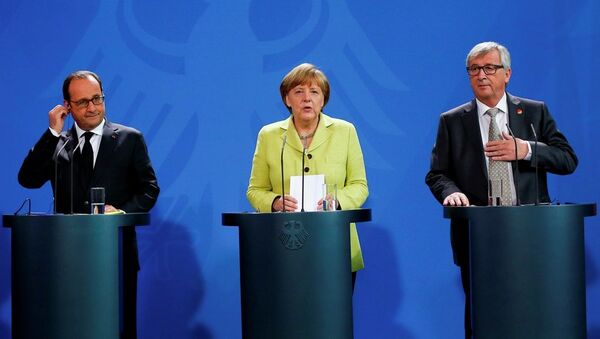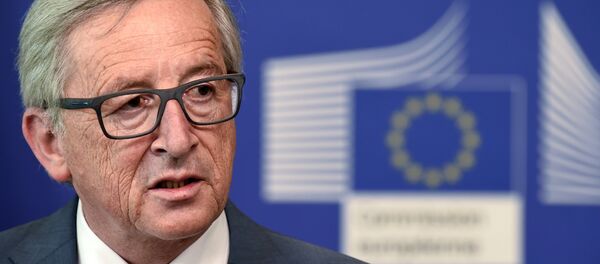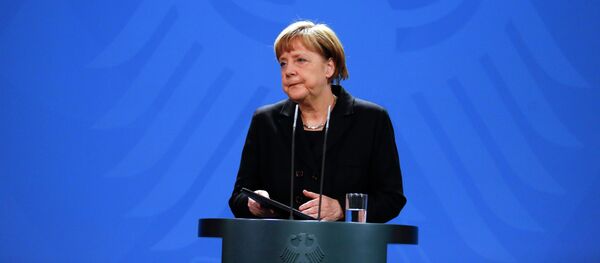Juncker Fronting 'Yes' Campaign
Most vocal about keeping Greece in the currency was Juncker, who made a passionate plea to Greeks, urging them to vote 'yes' in this Sunday’s referendum and in turn agree to a new debt deal with the country’s creditors – the Eurozone, European Central Bank (ECB) and the International Monetary Fund (IMF).
"#Greece is Europe, #Europe is Greece" / "Η Ελλάδα είναι Ευρώπη, η Ευρώπη είναι Ελλάδα" @JunckerEU https://t.co/xmXvkhrkj1
— European Commission (@EU_Commission) June 29, 2015
The EC president said he was "deeply distressed and saddened by the spectacle that Europe gave last Saturday," when talks between Greek and Eurozone officials seemingly broke down, with Athens' finance minister Yanis Varoufakis leaving discussions in Brussels, and a referendum was agreed upon by Greece’s government.
Juncker accused Greek Prime Minister Alexis Tsipras of not telling the full truth about negotiations and said that the door was still open to negotiations, in what was seen as a last, desperate plea for the Greek government to return to the negotiating table.
Democracy deserved a boost in euro-related matters. We just delivered it. Let the people decide. (Funny how radical this concept sounds!)
— Yanis Varoufakis (@yanisvaroufakis) June 26, 2015
His comments urging Greeks to stay in the union and "not to commit suicide for fear of death" were criticized by many as being insensitive, particular given the rise in Greece's suicide rate following the introduction of the EU’s austerity measures.
European Parliament chief Martin Schulz backed Juncker's argument, urging Greeks to vote in favor of accepting terms offered by the creditors.
Euro Leaders Urge Decision is About the Euro
While officials in Athens have played down the fear that a vote against the deal offered up by creditors would necessarily lead to a Grexit from the euro currency, European leaders have rammed home that they believe Sunday’s vote is a choice between staying in the Eurozone and opting to leave.
Angela Merkel was at her diplomatic best arguing that no one should interfere with Greece’s democratic process, but warned that the euro faces a "decisive challenge" over the next few weeks, while Greeks also needed to be aware of the consequences of any decision taken.
However Merkel’s deputy, German vice-chancellor Sigmar Gabriel was much more forthright, criticizing the actions of the Greek government and saying that Greece’s decision on Sunday was a clear choice of whether they wanted to remain in the euro or change to a different currency.
#Hollande wants Greek negotiation to start again. #Greece — https://t.co/bLFbVjyeK6
— EUobserver (@euobs) June 29, 2015
French President Francois Hollande joined the fray, backing Merkel’s claim that the Greek people shouldn’t be influenced on their decision, but once again placing pressure on Greeks by saying that the decision would have a huge impact on the country potentially being forced out of the single currency.
"It is democracy, it is the right of the Greek people to decide what they want for their future. What is at stake is whether or not Greeks want to stay in the Eurozone (or) take the risk of leaving."
Italian Prime Minister Matteo Renzi, who was seen as somewhat of an ally to Tsipras, compounded the message that the Greek people faced a choice between whether to remain in the euro, or return to the country’s former currency, tweeting:
"The point is: Greek referendum won’t be a derby EU Commission vs Tsipras, but euro vs dracma. This is the choice."
The intervention of the leaders is set to further divide opinion in Greece, and has been interpreted by analysts as a sign that European officials are seriously concerned that Greek voters may reject the proposals put forward by creditors.






